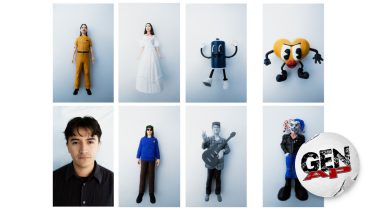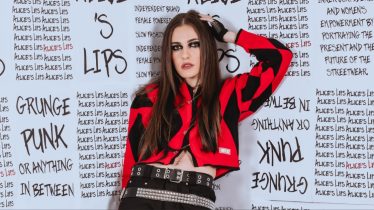Taking Back Sunday's Adam Lazzara on shaking the shackles of nostalgia
Adam Lazzara of Taking Back Sunday is taking a break. Two years after the release of Taking Back Sunday’s 2016 album Tidal Wave, the lead singer is using his free time wisely: He recently had his third child and has gone back to school to study audio engineering.
Read more: Asking Alexandria drop heartwarming video for “Someone, Somewhere”
It’s a necessary reprieve for someone who’s been on the go in a hugely popular band for almost 20 years. Taking Back Sunday’s debut album was released in 2002, when Lazzara, now 36, was just 20. Tell All Your Friends and the subsequent two albums, Where You Want to Be in 2004 and Louder Now in 2006, quickly, if unintentionally, became staples of emo. Songs such as “Cute Without The ‘E’ (Cut From The Team)” and “MakeDamnSure” are what comes to mind when they think of not only Taking Back Sunday, but emo; the loud guitars, screaming backing vocals and melodramatic, often violent lyrics that are intrinsic to the genre. But that legendary status has its downside, especially with the recent boom in emo nostalgia., Fans sometimes only want to revisit the music of the past while ignoring what’s been happening in the last decade.
In the 12 years since the release of Louder Now, Taking Back Sunday have released four more records, more than they had when they were associated with emo. New Again, Taking Back Sunday, Happiness Is and Tidal Wave(all released two or three years apart), prove that the band are as prolific as ever, but far more mature. While they struggle to shake the shackles of nostalgia, through lineup changes, marriages and their personal lives, the band have matured and are still playing as hard as ever. Ahead of their first show in the U.K. this year, a slot at the Slam Dunk Festival, we spoke to Lazzara about the present and future of Taking Back Sunday, navigating fan nostalgia when emo is having such a moment and how things have changed for the band and music in the last 20 years.
Hey Adam! Are you looking forward to Slam Dunk?
Adam Lazzara: Yes, I am. I’m happy that they’re having us back. For a lot of the festivals I don’t really find myself going to check the lineup, but then I just got to thinking, “Man, I need to see who else is on there,” and it’s a great lineup this year, too. I’m really excited.
So what are you working on next? Your next record was 2016, right?
Yeah, it’s crazy to think about. I was just having a conversation with John [Nolan, guitarist] about how it just doesn’t feel like it’s been two years. It’s gone by so quickly. But there’s a couple of songs that we’ve been working out. We were in the studio two weeks ago just kicking around ideas, throwing them at the wall and seeing what sticks. There’ve been some shows here and there, but there’s nothing too heavy. I started going back to school, so having this time really afforded me the opportunity to do that.
I’m interested in how you think the current nostalgia boom for emo impacts how you’re viewed now. Do you think it hinders your progress, at least in how you’re seen?
It does. The thing I get worried about is that if it’s all just nostalgia, then there’s not much thought to what you’ve been working on or where you’ve been since whatever that time was that people are being nostalgic about. I know for me, for some of my favorite bands, one of the things that makes them my favorite is that I feel like every different stage in my life they’ve had a record that matched that. It’s almost like we were growing up together.
So then when it comes to Taking Back Sunday, I just would hope that people could do the same thing with us, because I would imagine that for a lot of folks we were probably going through similar things at similar times in our lives. Sometimes people will put online, “Oh my God, my 18-year-old self would be freaking out right now.” It’s like, “Yeah, you’re a different version of that person, but you’re speaking of yourself in the third person.” A person saying that, “Oh my whatever-age self would be freaking out,” to me that could very well be like, “I’m freaking out because of this song and how it made me feel.”
It makes sense. When I interview Pete Wentz or whoever, people are like, “Your 13-year-old self must be freaking out,” and I’m like, “No, I’m excited.”
Yeah, because you’re still the same person. You didn’t switch bodies at any point. Going back, I just think it’s troublesome when folks are looking to just relive this one specific thing when there’s so much more to it. There’s just more there that either they might like or that might help them out. I say this all the time, but the big thing that has been so awesome about being able to be in the band and write songs all these years is that, even for myself, it gives me this confirmation of, “Hey man, you’re not alone. There’s other people who feel like this.” That’s one of the things that has always made music so special to me.
When you wrote that music, you were in your teens or 20s, and a lot of your audience was too, so they related to what you were going through. But then as the bands get older and they get new problems, so do you.
Yeah, I mean that’s how I look at it. So that’s why I’m always a little leery of the nostalgia thing because it’s discounting the power of now.
Yeah. Because if you’re older and you try to sing about the problems you had when you were 20, it’s inauthentic anyway.
Yeah, exactly. I’m not going to write about the same thing I was writing about when I was 18. Because what would that say about me as a person? I haven’t grown or matured in those years? Nobody wants that.
I guess people see emo music as tied to adolescence, whereas if it’s a different genre they accept that change a little easier.
True. And also, I mean, I never looked at us as an emo band. That’s just what people started calling us at one point. That’s never really bothered us so long as people are listening. But as far as we’re concerned, we’ve always just been a rock ’n’ roll band. Big, loud drums, big, loud guitars. So with that said, that’s another thing about the whole nostalgia thing that some folks are subscribing to, because then it becomes less about the subject matter and less about the songs themselves and more about a fashion that was popular.
You’ve been a band for almost 20 years. How have you seen not just the scene but music generally change?
When we started, social media wasn’t a thing. So we’ve seen that change, just in how people get information and how people are sharing music and things like that. It’s been an interesting thing to navigate. I don’t think I’ve been on my social media for about three months now, and it’s been the best thing to just have that extra time and to not be watching these strangers live out life. Don’t get me wrong: We’ll go on tour then I’ll have some free time, then I’ll start checking Instagram again. I’m not saying I’m totally against it. But what we did see was that a lot of the mystery started to go away.
All my favorite bands growing up, one of the things I loved so much about them was that they were just this enigma. They were this mystery. You only knew about them through these interviews or write-ups. You had to fill in the blanks yourself, and that was the fun part of it, to me. Now there’s hardly any of that. So I think in that way, it’s kind of like The Wizard Of Oz when they realize there’s a man behind the curtain, you know, and all of a sudden it’s not so magical. So I worry that it’s a little like that now.
It can be really helpful for new artists to get their stuff out there and DIY their career until they’re noticed, but in other ways it sucks when you look up to someone, and then they say something, and you realize they’re just a person who says stupid shit just like you.
Even in that respect, that could be more humanizing, you know? So maybe that’s a good thing because now these people who are just fortunate enough to be doing what they love aren’t put up on this pedestal, which is another thing that could be good. I don’t know. There are arguments either way.










